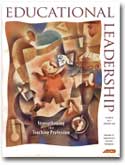A few years into my first teaching assignment, my principal announced to me that I was to have a student teacher in my classroom—someone to mentor, coach, and, presumably, teach how to teach, and—he tried to entice me—someone to share the load of grading papers and preparing lessons. I wasn't sold.
I was still fumbling with the basics of being a teacher. How do you persuade teenagers that "Bartleby the Scrivener" is relevant? What grade do you give a student whose thinking is insightful but who still doesn't know the difference between it's and its?
Then there were the existential anxieties: Why did I have disastrous teaching days even when I had prepared good lessons? And finally: Should I quit teaching next year—and find some job I'm better at?
I voiced some of my concerns to my principal, noting that a teacher down the hall was recognized throughout the city for her expertise. Why didn't she coach the rookie? The answer was that the expert teacher didn't want a student teacher—it would take too much time away from her high school preps.
So, of course, I got my student teacher. I had never had a professional mentor myself, having managed to acquire a lifetime certificate after a month of substitute teaching. That I wanted to acquire my teaching experience that way is almost as amazing as the fact that my college authorized it as my student teaching. Anyway—and there is no big finish to this story—my student teacher and I managed to get through the semester. We learned something from one another, and perhaps the students learned, too. At least they had two well-meaning co-teachers who gave it their best shot.
The profession has come a long way since those days. Concerns about too little training and lack of follow-through for beginning teachers have led teacher education institutions and cooperating schools to revamp their teaching programs. One of the most exciting developments is the Professional Development School, where beginners learn from a host of colleagues—including professors, cooperating teachers, specialists, aides, and their own cohort group—over a two- to three-year period (pp. 44, 48, 52, 56). Student teachers can consider multiple perspectives and practice in many different settings before they take responsibility for their own classes.
The use of videotapes, journals, and portfolios has also made the process of acquiring teaching experience more reflective and less hit or miss. Debriefing sessions during which both beginning and experienced teachers not only critique performance but also discuss problems and successes have become a staple of the process of becoming a teacher. Finally, professionals have begun to spell out what a teacher must know and be able to do at different stages of growth ( p. 6). Such self-determination is our best hope that a professional knowledge of practice can be systematically passed along from those who know how, to those who aspire, to teach.
Some things change slowly in the teaching profession, however. Although today most cooperating teachers would get release time from classes to adequately assist a beginner, master teachers are not always recognized—or paid—for this additional professional responsibility. And, judging by the statistics for those who quit in their first five years of practice (p. 33), beginning teachers still feel isolation once the classroom door closes.
In his inspiring new book The Courage to Teach, Parker J. Palmer reminds us of the complexity of becoming a teacher:If we want to grow in our practice, we have two primary places to go: to the inner ground from which good teaching comes and to the community of fellow teachers from whom we can learn more about ourselves and our craft. . . . The resources we need in order to grow as teachers are abundant within the community of colleagues. Good talk about good teaching is what we need—to enhance both our professional practice and the selfhood from which it comes.
I hope that my former student teacher is out there in the profession today, having found many mentors and learned how to be one herself. As for the expert teacher, maybe she realizes now that coaching a colleague is as vital to her profession as teaching a subject or reaching a student. Although I have changed careers, I've learned to see the continuity in the profession. One never finishes learning how to teach.
